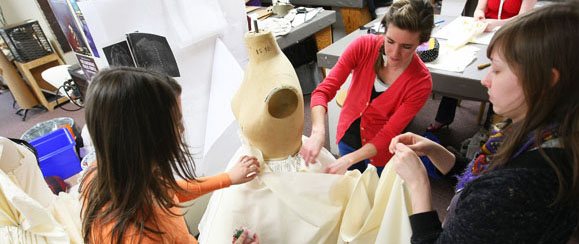Costume Studies
What is the Costume Studies program like?
 The Costume Studies program is unique in North America, and offers a four-year BA with Honours in Theatre (Costume Studies). The program has a strong historical focus on both theatre and museum work. It ²õ³Ù°ù±ð²õ²õ±ð²õÌýapplied skills, along with research and academic skills. The applied skills are taught using a conservatory approach, while the research and academic components are delivered through a more traditional university pathway.
The Costume Studies program is unique in North America, and offers a four-year BA with Honours in Theatre (Costume Studies). The program has a strong historical focus on both theatre and museum work. It ²õ³Ù°ù±ð²õ²õ±ð²õÌýapplied skills, along with research and academic skills. The applied skills are taught using a conservatory approach, while the research and academic components are delivered through a more traditional university pathway.
You’ll achieve a well-rounded education. You’ll be able to create costumes from any historical period and for both genders. You’ll also acquire the problem-solving skills  expected of graduates with a broad liberal arts education.
In the hands-on skills segments of the classes, you’ll obtain a firm foundation in:
•designer’s language
•t²¹¾±±ô´Ç°ù¾±²Ô²µ
•the aesthetics of historical and modern dress
•pattern designing of garments from 1680 to the present
•costume as sculpture
•costume technology
•costume in performance.
Not only do our students learn to create clothing from any period in history using bespoke, one-of-a-kind couturier methods, but also through the academic component within each class. Students learn why and how clothing contributes to the formation of personal, community, and cultural identities. You’ll gain a strong proficiency in costume history from antiquity to the present, exploring why people clothed themselves as they did, and pay particular attention to the social and cultural influences at play, along with class and gender differentiation.
In addition to class projects and assignments you’ll hone your applied and academic skills in costuming by working on costumes for several Fountain School's stage productions. Your fourth year includes the creation of a major historical research project which is presented to the public on stage at our new Joseph Strug Concert Hall. It is within these two requirements of the program – one grounded in the magic of theatre, one steeped in the sensuality of history – that the individual elements of the program are realized and appreciated. It is here that students are able to gauge public reaction to their work, which is a valuable part of their education experience.
